2024 International Congress on Medieval Studies: Program
November 24, 2023 in Abstracts of Conference Papers, Announcements, Business Meeting, Conference Announcement, ICMS, International Congress on Medieval Studies, Kalamazoo, POMONA, Postal History at Kalamazoo, Reception, Societas Magica
2024 International Congress on Medieval Studies: Program
59th ICMS (9–11 May 2024)
To be held in a transitional ‘hybrid’ form
with RGME Co-Sponsored Sessions,
an Open Business Meeting,
and Co-Sponsored Reception
[Posted on 23 November 2023, with updates]
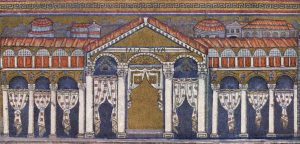
Ravenna, Sant’Apollinare Nuovo, Mosaic. Artwork in the public domain; photograph provided by The Yorck Project / Wikimedia Commons (GFDL).
After the successful completion of our Call for Papers for the 2024 International Congress on Medieval Studies (ICMS), we announce the Program for our activities, with:
- three Co-sponsored Sessions
- our Open Business Meeting and
- a co-sponsored Anniversary Reception.
In stages, first (in November 2023) we announced the Sessions. Next (4 January 2024), with information from the ICMS, we could report their assigned times, days, and locations on campus in cases of the in-person events, along with our other activities at the Congress.
Now we can report the sequence of papers for the sessions; we also begin to publish the abstracts for them.
Note that for the In-Person Sessions and the Open Business Meeting, the RGME provides an online option for Congress Registrants through our Zoom Subscription and our Eventbrite Registration Portal. See below and
Congress Information
- 2024 Congress Program for the full ICMS
Registration (required) for the Congress has opened in February:
‘Hybrid’ Facilities
Like last year (see 2023 International Congress on Medieval Studies: Report), the RGME offers Registration (without charge) for Online access through our Zoom Subscription to some of our In-Person events this year. Likewise we offer registration for two of our In-Person events to help us to learn how many to expect to attend for our planning and the catering:
- Open Business Meeting (In Person)
and - Co-Sponsored Reception (In Person)
For an Online Session, a remote-participation conference room has been reserved so that participants and attendees on campus for the Congress might gather to join the online format while in company.
(For information, see below.)
At ICMS for the RGME Anniversary Year
In 2024, the RGME celebrates its Anniversary Year to mark 25 years as a nonprofit educational corporation based in Princeton, New Jersey, and 25 years as an international scholarly society founded out of a major research project at Corpus Christi College in the University of Cambridge.
For our Anniversary Year, the theme is “Bridges”.
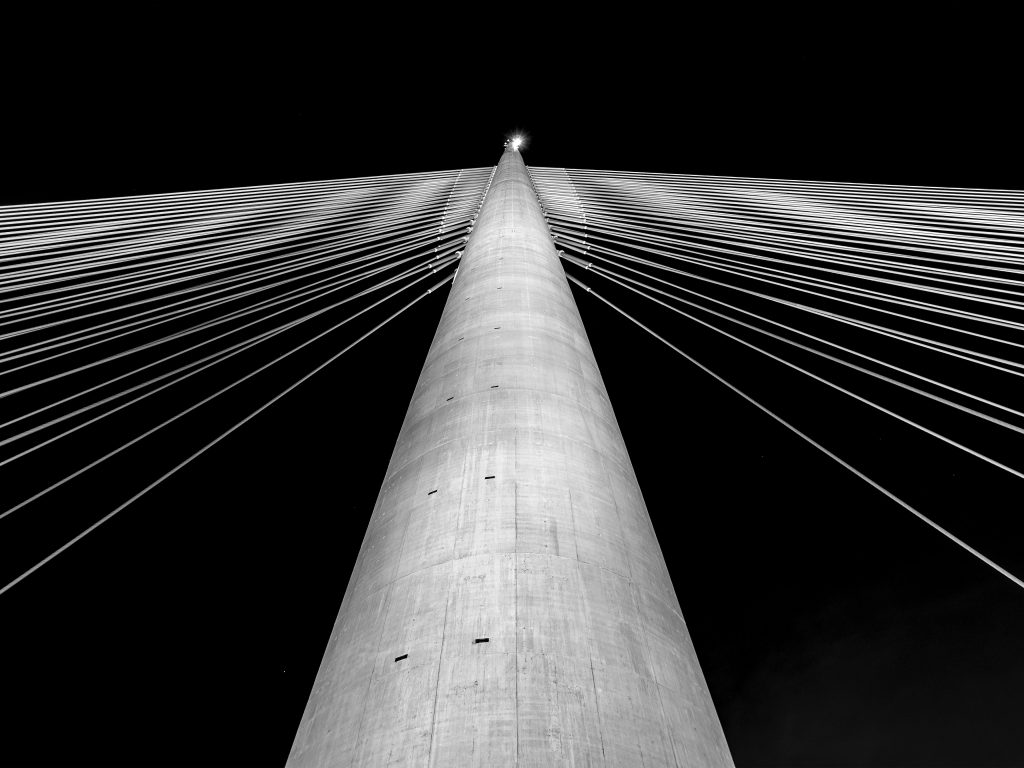
Ada Bridge pylon, Belgrade, Serbia. Photograph Petar Milošević (1 August 2021). Image via Wikimedia Creative Commons Attribution-Share Alike 4.0 International license.
RGME Sessions (1–3) at the 2024 ICMS
For the 59th International Congress on Medieval Studies in 2024, with responses to our Call for Papers, the RGME co-sponsors these three Sessions. Two of three are scheduled to take place in person, with the other online.
Arrangements have been made so that all three can be accessed both in person (whether as scheduled in the Congress Program or as arranged by especially reserving a room on campus) and online (whether as scheduled or as arranged for a Zoom Meeting hosted by the RGME). Thus their access can constitute a truly hybrid approach to the conference.
We begin (2 May) to post the Abstracts of the Papers for the Sessions.
Locations on Campus
For the locations on campus, see these campus maps:
- WMU Visitors’ Map
- Parking Combined
- Interactive Map with Building, Parking, Accessibility Information.
With the room- and time-assignments set in place in the 2024 Congress Program, we list our Sessions in their temporal sequence (Thursday morning, Friday afternoon, Saturday afternoon), then turn to our other activities (Thursday lunchtime, Thursday evening).
For all these activities, we have now produced Posters, with concise and updated information as well as feature images. As a new development this year, we present them in a virtual Pop-Up Exhibition of their own. See:
RGME Pop-Up Poster Exhibition for the 2024 ICMS
1. “Alchemical Manuscripts, Early Printed Books,
and Other Materials”
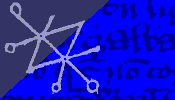
Societas Magica logo
With the Societas Magica, for the twenty-first consecutive year.
Organized by David Porreca (Department of Classics, University of Waterloo)
Session 26 (2024 Congress Program, page 10)
Thursday, 9 May 2024: 10:00 – 11:30 am EDT (GMT-4)
Sangren Hall 4510
In-Person
with RGME online Option (by registration specifically for the online version of the event)
Abstract
By the later Middle Ages, alchemy was a venerable tradition that had generated hundreds of texts that ranged from the practical (laboratory manuals and notebooks) to the mystical (alternative interpretations of the practical manuals written in code) to the aesthetic (lavishly illustrated manuscripts of the first two types). There is at least one major critical edition project of alchemical texts that is in the planning stages at the moment (alchemical texts attributed to Hermes Trismegistus, as part of Brepols Publishers’ Hermes Latinus sub-series of the Corpus Christianorum Continuatio Mediaevalis). This session is intended partly to act as a spring-board for that project.
We seek papers that address the challenges of editing alchemical texts (palaeography, codicology, critical editing techniques), as well as the contents of those texts (history of science, mysticism, iconography), and the practica of using them (the material culture of laboratory equipment). The session will also embrace papers that study of alchemical allegories and symbolism when text and image interact.
Presider
Marla Segol (University of Buffalo)
Presenters
David Porreca
“De Septem tractatus seu capitula Hermetis Trismegisti:
Toward a Critical Edition”
Alexandra Ballová (Masarykova University)
“To Divide the Flesh from Soul”:
Hieronmus Brunschwig‘s Early Printed Book on Distillation and its Unique Czech Translation”
(Congress Travel Award Winner)
Note: Online Option for this Session
(for Congress Registrants)
As an alternate to attending this Session in person at the Congress, as scheduled, you might attend online via RGME Zoom. To do so, please register here:
There is no registration fee for this event (apart from the Congress registration); we welcome Voluntary Donations for our Section 501(c)(3) nonprofit educational organization through this registration.
After registration, the Zoom Link will be sent to you.

London, British Library, Sloane MS 2560, folio 12r. Donum Dei (‘The Gift of God’), Germany or Austria, 15th century. Page of text with illustration of a flask with black at the top and white or aqua (water) below.
Note on the Image. London, British Library, Sloane MS , folio 12r.
Page of text with image of a flask purifying a black substance to white, or aqua (“water”).
Image via https://blogs.bl.uk/digitisedmanuscripts/2017/05/alchemy-the-great-art.html.
*****
2. “Letters, Couriers, and Post Offices:
Mail in the Medieval World”
Co-sponsored, for the first year, with the newly founded organization “Postal History at Kalamazoo”
Organized by David W. Sorenson (Allen G. Berman, Numismatist)
Session 310 (2024 Congress Program, page 112)
Friday, May 10, 2024: 3:30 PM – 5:00 PM EDT (GMT-4)
In-person with RGME online Option (with registration)
Student Center, 2207
Abstract
The role of mail delivery systems was an important one in the medieval world , whether the West or in other literate parts of the world. Postal history has generally been studied largely as an adjunct to stamp collecting, or as an aid to reading the contents of letters, but not so frequently as a subject in its own right, particularly in conferences such as the ICMS. As such, it would perhaps be an appropriate time to consider the “moving of the mail” as a subject of study in its own right.
Mail has played an important part in human activity in literate societies, in the West as elsewhere, since the days of the Sumerians. Providing the primary means of conveying information at a distance, it functioned as a vital part of the pre-modern infrastructure. In this session we cover various technical aspects of medieval mail; rather than studying its contents, we will look at its delivery systems in their various aspects. Whether private or governmental, whether involving “stamps” or postmarks, whether private or public, mail helped make the world, and we propose a session dedicated to studying its roles.
Presider
Mildred Budny (Director, Research Group on Manuscript Evidence)
Presenters
Michael Allman Conrad (University of Saint Gallen)
“When Mail Became Snail:
The First Postal Contracts and the Circulation of Information
between Spain and the Holy Roman Empire”
David W. Sorenson
“Taking It to the Mailbox:
A Fragment of a Fifteenth-Century Lawyer’s Mail Ledger”
Eleanor A. Congdon (Youngstown State University)
“The Time It Takes:
Notations about the Time Merchant Letters Take to Reach Their Recipients”
Online Option for this Session (for Congress Registrants)
To attend this Session online via RGME Zoom, please register here:
There is no registration fee for this event (apart from the Congress registration); we welcome Voluntary Donations for our Section 501(c)(3) nonprofit educational organization through this registration. After registration, the Zoom Link will be sent to you.
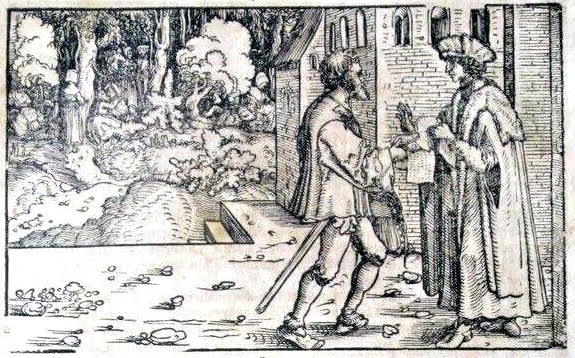
Private Collection, Courier delivering letter. German translation of Petrarch (1559).
Note on the Image. A courier delivering letters, from a German translation of Petrarch dated 1559. From the text the news appears to have been bad. The courier is wearing a long, military-style sword along with his mail-bag; presumably he has on a brigandine or similar armour as well, hence the bulky jacket.
Here follows a sampling of images of original documents which passed through some means or other to reach their destinations (and survive to another day, albeit far away).
Specimen 1

Private Collection, Swiss Merchant’s Single-Page Letter on Paper in Middle High German, circa 1400-1430: Address Panel.
Specimen 2

Private Collection, Swiss Merchant’s Single-Page Letter on Paper in Middle High German, circa 1400-1430: Text.
Specimen 3

Private Collection, Single-sheet Letter in Portuguese to Pedro Lopez in Andalusia:
Face or Recto. Probably 15th century.
Specimen 4

Berlin, Gemäldegalerie, Hans Holbein the Younger (1497/1498 – 1543), oil on wood. Portrait of the merchant George Gisze, 1532. Image Public Domain, via Wikimedia Commons.
*****
3. “Retrospect and Prospect for P.-O.M.o.N.A. . . .
As the Curtain Falls (A Roundtable)”
Co-sponsored with P.-O.M.o.N.A. (Polytheism-Oriented Medievalists of North America), for the fourth year
Organized by Phillip Bernhardt–House (Academic Vagabond)
Session 476 (2024 Congress Program, page 170)
Saturday, May 11, 2024: 3:30 PM – 5:00 PM EDT (GMT-4)
Hybrid Format
Online
and
In Person at Sangren Hall Meeting Room 2809 inside Swain Library
This conference room is reserved as a remote participation room for people attending this online Roundtable in person at the Congress
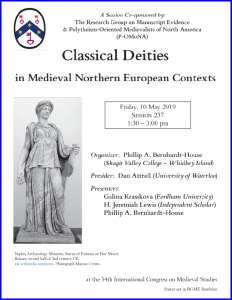
P.-O.M.o.N.A. Session ICMS 2019
Abstract
P.-O.M.o.N.A. was founded to provide a specific and dedicated forum for what had been occurring for more than a century in various Medieval Studies disciplines: namely, discussing the use (and abuse!) of medieval sources for understanding the polytheistic practices of pre-Christian Europe. Our events have been varied, but as the organization comes to its final event, we ask: was it worth it, and is there a future need for this sort of specialized forum in relation to this topic? Our panel of experts will give their opinions, and the audience in attendance will be free to join in the discussion.
Presider
Phillip A. Bernhardt–House
Panelists
Mildred Budny (Director, Research Group on Manuscript Evidence)
Dan Attrell (Department of Classics, University of Waterloo)
Angela Puca (Leeds Trinity University)
Note: Angela Puca will not attend.
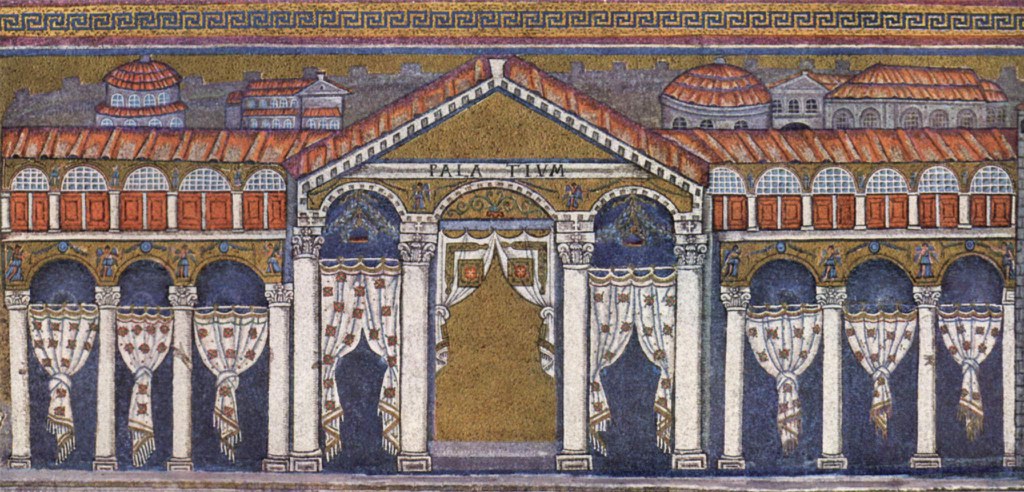
Ravenna, Sant’Apollinare Nuovo, Mosaic depicting the Palace of Theodoric. Artwork in the public domain; photograph provided by The Yorck Project / Wikimedia Commons (GFDL).
*****
RGME Activities at the 2024 ICMS
As customary, the RGME holds an Open Business Meeting at the Congress. As frequently, the RGME co-hosts a Reception.
This year, in our Anniversary Year, the Reception is co-hosted by the Societas Magica, whose sponsorship we thank.
Like 2023, both these events take place on Thursday, the first day of the Congress.
1. RGME Open Business Meeting
All are welcome. Lunch will be provided, with donations welcome to cover the expenses.
Thursday, May 9, 2024: 12:00 PM – 1:00 PM EDT (GMT-4)
Student Center, 3205
Presider: Mildred Budny, Director of the RGME
Arrangements for online attendance by RGME Zoom are available for Conference registrants.
Register by Eventbrite to attend our Open Business Meeting
In Person or Online

Illustrated Handlist No. 5. Notebook of “Recettes” in French, open at the front with inserted slips. Photography by Mildred Budny.
You are welcome to attend our Open Business Meeting if you register for the Congress. The Meeting will take place in person, but we will provide online access to it by RGME Zoom, like last year.
You could attend in person without further registration, but we ask that you register to let us know that you will attend, so as to aid our planning for the catering for lunch. You must register for online attendance so as to receive the Zoom Link.
To register, please visit the RGME Eventbrite portal:
To register for this event, there are two modalities.
1) In-Person
2) Online
After registering, the Zoom Link will be sent to you a few days before the event.
(On the image at upper right here, see The Illustrated Handlist, Number 5.)
More Information and the Agenda
- See further: 2024 Open Business Meeting at the ICMS, with the Agenda.
2. RGME Anniversary Reception

Societas Magica logo
Co-sponsored by the Societas Magica
Thursday, May 9, 2024: 6:00 PM – 7:00 PM EDT (GMT-4)
In-person
Student Center, 3205
Please register to let us know how many to expect.
Via the RGME Eventbrite portal:
For this event:
- 2024 Anniversary Reception: Tickets (with Voluntary Donation)
About Donations and their purposes for our Anniversary and beyond, see

Washington, D.C., National Gallery of Art. Jacob van Walscapelle, Still Life with Fruit (1675). Image cropped. Image Public Domain via https://www.nga.gov/collection/art-object-page.119295.html
*****
Future Events
Our Anniversary Year features more events to celebrate through the year. See, for example:
- 2024 and 2024 Activities
- Episode 16. An Interview with Jesse D. Hurlbut
- 2024 International Congress on Medieval Studies at Leeds: Program
- Episode 17. “RGME Retrospect and Prospects: Anniversary Reflections
- 2024 Autumn Symposium: “At the Helm”
- Episode 18. “Women as Makers of Books
You may register for all these events through the RGME Eventbrite Portal.
See also
Join us!
*****
Questions or Suggestions?
Please leave your comments or questions below, Contact Us, or visit
- our FaceBook Page
- our Facebook Group
- our Twitter Feed (@rgme_mss)
- our Bluesky nest @rgmesocial.bluesky.social)
- our LinkedIn Group
- our Blog on Manuscript Studies and its Contents List
We invite you to join:
Donations and contributions , in funds or in kind, are welcome and easy to give. Given our low overheads, your donations have direct impact on our work and the furtherance of our mission. For our Section 501(c)(3) nonprofit educational organization, your donations may be tax-deductible to the fullest extent permitted by law. Thank you for your support!
We look forward to hearing from you and seeing you at our events.
*****
